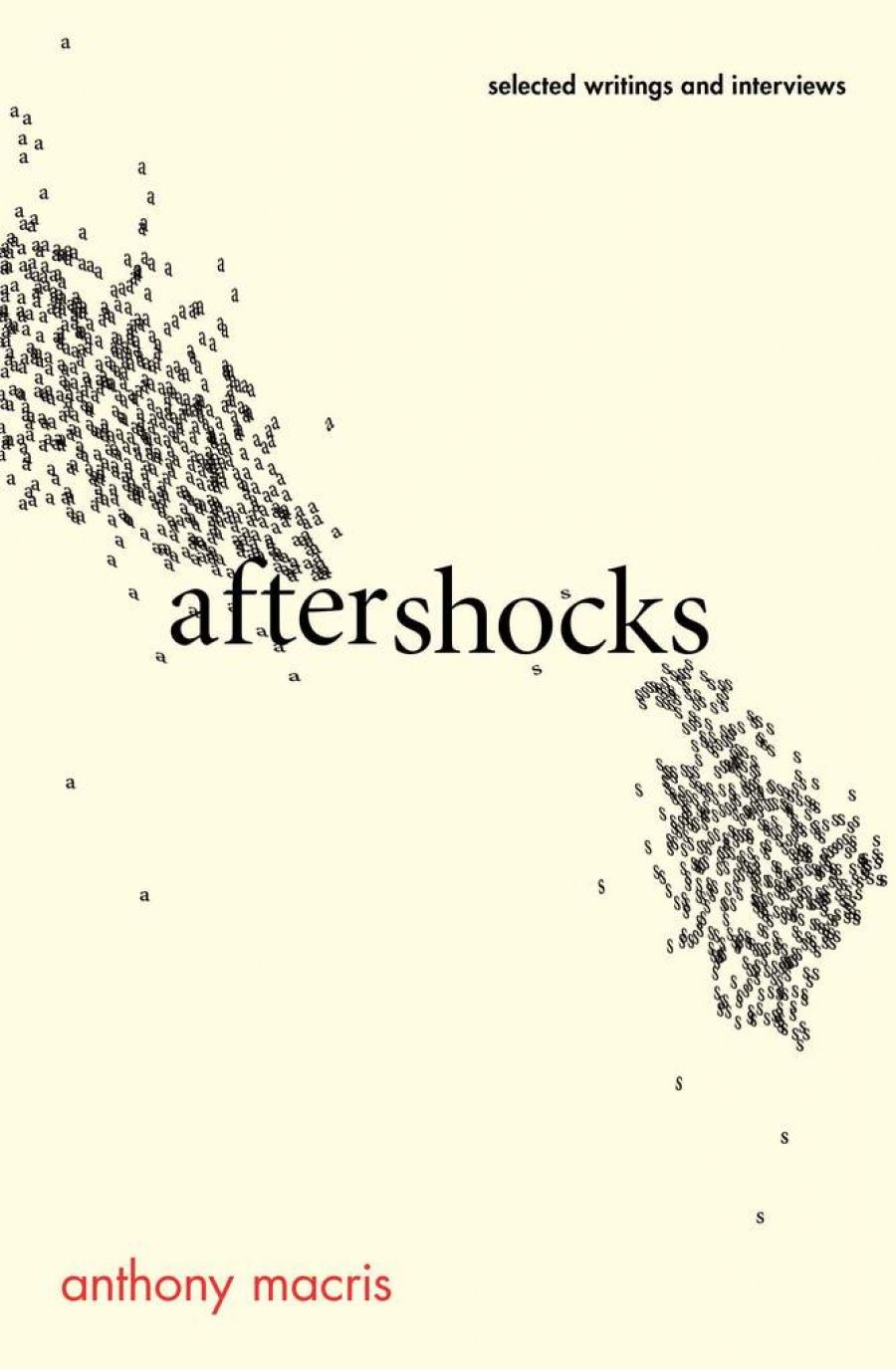
- Free Article: No
- Contents Category: Essay Collection
- Review Article: Yes
- Online Only: No
- Custom Highlight Text:
At the beginning of this wide-ranging collection of criticism by the novelist, critic, and academic Anthony Macris, the author notes wryly that an early candidate for the book’s title was Personality Crisis, such is its diversity of topics and styles. The implication here is that reviews and essays form a kind of autobiography. I’m not sure I would use the word ‘crisis’ to describe it, but certainly the portrait we have in this case is of a writer driven by very different kinds of curiosity: about literature and writing but also the art forms that lie beyond them – and, as centrally, by a social and political curiosity about the ways those forms change when they respond to the world around us.
- Grid Image (300px * 250px):

- Book 1 Title: Aftershocks
- Book 1 Subtitle: Selected writings and interviews
- Book 1 Biblio: UWA Publishing, $29.99 pb, 349 pp
Given Macris’s varied career, it is not surprising that a collection of his criticism yields many different subject matters. The title he ultimately chose alludes to the ‘subterranean forces that have shaped the first two decades of the 2000s’. For Macris, these are terrorism, climate change, and neoliberal economics. But books are at his work’s core, as well as a rich assembly of writing about films and exhibitions, interviews with visiting artists, and essays on more scholarly topics such as literary realism and Macris’s reflections on the writing process.
Those reflections open the book, along with essays about the novel as a form, the role of art, and an insightful piece about the troubles of the Norwegian memoirist Karl Ove Knausgaard and why we seem so captivated by them. Here, Macris joins the sensibilities of a writer with the broader awareness of a theorist. He situates Knausgaard in an Aristotelian tradition that puts action ahead of character, an approach that sponsors Knausgaard’s self-concern but also his less concerned characterisation of others.
The fusion of theory and practice appears again towards the end of Aftershocks in a series of interviews with Macris himself. In one from the Los Angeles Review of Books, he comments on the role of the novel as a witness to ‘capitalism’s terrible dynamism, its crushing prevalence’. Perhaps more unusual, though, is how Macris positions this witnessing as a formal question as much as one of subject matter. It is fascinating to read a writer’s reflections on his practice when he is so consciously positioned in terms of literary movements. As Macris puts it, he has been trying ‘to take the spirit of the modernist tradition, always an internationalist spirit, and to see and speak things that haven’t been seen or spoken before, at least in the form of the novel’.
Whether the short review pieces that occupy the middle sections of this book do enough to bear out such interests is another question. Macris writes very good reviews. Though he is clearly motivated by sociopolitical concerns, he is also an open and responsive reader. Despite the brevity of the reviews, in some he is able to include wider theoretical concerns. This is particularly the case in his reviews of Don DeLillo, Michel Houellebecq, and Martin Amis. As a number of their books are reviewed, we get the chance to relate them and indeed to connect them to the collection as a whole.
I wondered whether his short reviews belonged in the same collection as the essays, interviews, and sociopolitical analyses. Naturally, they are intended for newspapers and magazines, where the task is to respond quickly to new work. But in the context of a collection like this, they seem fragmentary, over before they really begin. Perhaps because of this, they have been gathered in sections based on the geographical origin of the works being reviewed: American Fiction and Nonfiction, British Fiction and Nonfiction, and so on. These parameters add categorisation and a sense of unity to this part of the book, but of course less in thematic development and weight.
Another inclusion one might question is that of three previously unpublished pieces about film, which Macris wrote in the late 1990s. While the short reviews suffer from having a very specific purpose, these earlier works struck me as still searching for theirs. The ideas are developing on the page, almost as explanations and notes to himself. And yet, this may well be the point of featuring them here, for they do illuminate the personality of the author through the longevity and multifariousness of his obsessions.
An earlier title for that appetite was ‘split personality’. Perhaps that wasn’t so very far from what Macris went with in the end. The aftershocks he has in mind are those of a post-9/11 world, but, as much as that, they are the unpredictable and varied reactions of a writer willing to be affected by it.


Comments powered by CComment